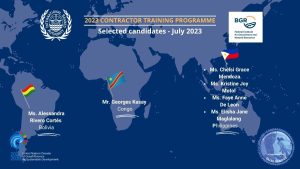
UPDATE (06 July 2023) The following candidates have been selected:
| Rank | First Name | Surname | Gender | Country | Country Class. |
| First-ranked candidates | |||||
| 1 | Faye Anne | De Leon | Female | Philippines | |
| 2 | Elisha Jane | Maglalang | Female | Philippines | |
| Reserves or alternate candidates | |||||
| R1 | Bijesh | Cheriya Moothoor | Male | India | |
| R2 | Joseph | Aisabokhae | Male | Nigeria | |
Issue date: 4 April 2023
The Federal Institute for Geosciences and Natural Resources of the Federal Republic of Germany (BGR), in accordance with its exploration contract for polymetallic sulphides signed with ISA on 6 May 2015, is offering two (2) at-sea and post cruise training opportunities for candidates from developing States within its 2023 training programme.
The training is divided into two stages:
Part 1: Candidates will participate in an exploration cruise onboard RV Sonne to the German contract area in the Indian Ocean. The cruise is planned to take place from 3-27 September 2023 for a duration of 24 days (including roundtrip transit from port of call to working area). Port of call: Port Louis, Mauritius. Specific details for the cruise is to be determined and will be communicated to the trainees with sufficient lead time to prepare.
The major objective of the cruise is the investigation of the subseafloor mineralization of selected hydrothermal systems applying deep-towed geophysical instruments such as controlled-source electromagnetics (CSEM), magnetics, and self-potential. Additionally, biodiversity investigations based on video inspection and bathymetric mapping will be carried out.
Marine CSEM induction and magnetic methods demand sensitive instruments that can operate in conductive seawater and can be handled from a ship or underwater vehicle with high lateral and near-seafloor resolution. BGR has developed a novel electromagnetic deep-sea profiler (“Golden Eye”). This instrument as well as BGR’s deep-towed bathymetry sled Homeside, equipped with a vector-magnetometer and towing three-axial self-potential sensors, will be deployed during the cruise.
During the cruise, trainees will be integrated into the station work for recording the geophysical data. They will also receive training on:
• Vessel navigation techniques and planning of an exploration survey;
• Preparation, on-board handling, and deployment of specialized geophysical surveying instruments;
• Operation of geophysical instruments at depth;
• Data handling and storage, data quality control;
• General aspects of work and environmental safety at sea.
Part 2: Subsequent to the onboard training, trainees will visit BGR, Hannover in spring/summer 2024 for a four-week post-cruise training to work on the results of the cruise. The training will mainly deal with 1D and 3D inversion modelling of and interpreting the geophysical data. It will also cover:
• Introduction to laboratory facilities at BGR;
• Introduction to data processing, modelling, and interpretation;
• Exemplary work on selected data samples under supervision; and
• Compilation of the cruise report and preliminary resource evaluation.
Qualification requirements:
Candidates must meet the following requirements:
1. Education: A bachelor’s /master’s degree in marine geophysics or an equivalent educational background.
2. A solid and proven background in standard geophysical data processing techniques.
3. Programming experience in higher programming languages is desirable.
4. Experience: At least one-year practical experience in the candidate’s field of specialization.
5. Language: A sound knowledge of English attested by a certificate, where applicable.
6. Health: Good state of health, suitable to work at sea.
7. Recommended: seagoing experience (seaworthy).
8. Proof of full vaccination against Covid-19 according to German law (three shots with a vaccine recognized in the EU).
Cost bearing:
BGR undertakes to cover roundtrip travel expenses (economy class) to port of call and Hannover, Germany, accommodation and daily allowance according to the governmental regulations of the Federal German law for travel expenses.
Trainees will be required to sign a confidentiality agreement with BGR. At the end of the training, trainees will be required to submit a report to BGR and ISA on the outcome of the training completed; the benefits and knowledge gained; and how the training will advance their career and/or education. Trainees will also receive certificates upon successful completion of the programme.
How to Apply:
All interested applicants are invited to register through the ISA online portal through which they will submit their applications together with the necessary requested documents including:
• A copy of current passport photo and valid passport biopage.
• Signed nomination form [docx | pdf] by the nominating entity.
• Copy of degree and other certifications.
• Copy of CV or Resume.
• Proof of sufficient knowledge of English, attested by certificate if language of study was not English.
• If selected, the trainee will be required to submit a medical certificate confirming their ability to work at-sea onboard an exploration cruise signed by a licensed physician. As well as proof of COVID-19 vaccination.
Application Deadline: 31 May 2023. Late or incomplete applications will not be processed.
One of the Voluntary Commitments registered by ISA at the 2017 UN Ocean Conference (#OceanAction 40768) and reiterated in 2022 was ‘Enhancing the role of Women in Marine Scientific Research through Capacity Building’ – As partner of the Women in Deep-Sea Research project (WIDSR), BGR has pledged to allocate 50% of the training opportunities to qualified women applicants.
All queries concerning these two training programmes should be directed to training@isa.org.jm[/vc_column_text][/vc_column][/vc_row]

